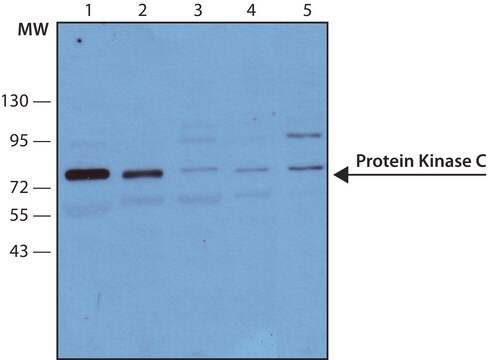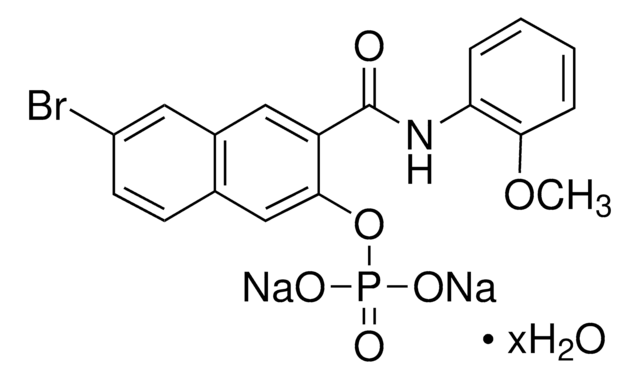Descripción general
Anti-Protein Kinase Cα is produced in rabbit using a synthetic peptide conjugated to keyhole limpet hemocyanin (KLH) as the immunogen. PKC is a phospholipid dependent enzyme, activated by the lipid 1,2-diacylglycerol (DAG), an intracellular second messenger produced from hydrolysis of inositol phospholipids, in response to a variety of hormones, growth factors, and neurotransmitters.
PKC α is a conventional isoform of Protein Kinase C (76-93 kD) and a member of serine/threonine (Ser/Thr) protein kinases. It is expressed ubiquitously in tissues and is the major isoform of PKC in fibroblasts. Stimulation and overexpression of PKC α increases the growth rate of cells in culture. Anti-Protein Kinase C α antibody is useful for studying expression of PKC α in normal and neoplastic tissues. It is also useful for detecting PKC α isoenzyme in brain tissue and cell extracts. Furthermore, it can be used in chemiluminescence detection systems to detect PKC α. Rabbit anti-protein kinase c α antibody reacts specifically with PKC α (80 kD) of rat brain extract or NIH3T3 mouse fibroblast lysate.
Especificidad
The antibody reacts in immunoblotting with PKCα in rat brain extract. Staining is specifically inhibited with PKCα immunizing peptide (659-672).
Inmunógeno
Synthetic peptide corresponding to amino acids from the C-terminal variable (V5) region of rat PKC α conjugated to KLH.
Aplicación
Anti-Protein Kinase C α has been used in immunoblotting and immunohistochemistry.
Anti-Protein Kinase Cα antibody produced in rabbit has been used in light microscopic—immunocytochemical analysis and immunofluorescent labelling.
Acciones bioquímicas o fisiológicas
Protein Kinase C (PKC) plays a crucial role in signal transduction leading to cellular regulation, cell growth and differentiation, oncogenesis and modulation of neurotransmission. PKC is a phospholipid dependent enzyme, activated by the lipid 1,2-diacylglycerol (DAG), an intracellular second messenger produced as a result from hydrolysis of inositol phospholipids, in response to a variety of hormones, growth factors and neurotransmitters. PKC is also the major cellular receptor for the tumor promoting phorbol esters. PKC action is mediated by binding to specific receptors for activated C-kinase (RACKs) and through the phosphorylation of several cellular substrates. Overexpression and stimulation of PKC α leads to enhanced growth rate of cells in culture. Anti-Protein Kinase C α antibody is useful for studying expression of PKC α in normal and neoplastic tissues.
Forma física
Supplied as a liquid containing 15 mM sodium azide as preservative
Almacenamiento y estabilidad
For continuous use, store at 2-8 °C. For extended storage freeze in working aliquots. Repeated freezing and thawing, or storage in "frost-free" freezers, is not recommended. If slight turbidity occurs upon prolonged storage, clarify the solution by centrifugation before use.
Cláusula de descargo de responsabilidad
Unless otherwise stated in our catalog or other company documentation accompanying the product(s), our products are intended for research use only and are not to be used for any other purpose, which includes but is not limited to, unauthorized commercial uses, in vitro diagnostic uses, ex vivo or in vivo therapeutic uses or any type of consumption or application to humans or animals.









